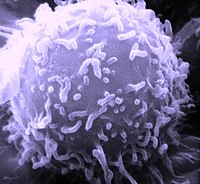
Photo from wikipedia
Adults and children exhibit a broad range of clinical outcomes from SARS-CoV-2 infection, with minimal to mild symptoms, especially in the pediatric age. However, some children present with a severe… Click to show full abstract
Adults and children exhibit a broad range of clinical outcomes from SARS-CoV-2 infection, with minimal to mild symptoms, especially in the pediatric age. However, some children present with a severe hyperinflammatory post-infectious complication named multisystem inflammatory syndrome in children (MIS-C), mainly affecting previously healthy subjects. Understanding these differences is still an ongoing challenge, that can lead to new therapeutic strategies and avoid unfavorable outcomes. In this review, we discuss the different roles of T lymphocyte subsets and interferon-γ (IFN-γ) in the immune responses of adults and children. Lymphopenia can influence these responses and represent a good predictor for the outcome, as reported by most authors. The increased IFN-γ response exhibited by children could be the starting point for the activation of a broad response that leads to MIS-C, with a significantly higher risk than in adults, although a single IFN signature has not been identified. Multicenter studies with large cohorts in both age groups are still needed to study SARS-CoV-2 pathogenesis with new tools and to understand how is possible to better modulate immune responses.
Journal Title: Journal of Personalized Medicine
Year Published: 2023
Link to full text (if available)
Share on Social Media: Sign Up to like & get
recommendations!